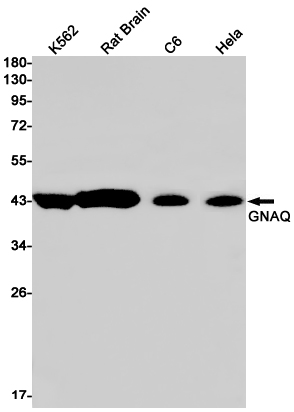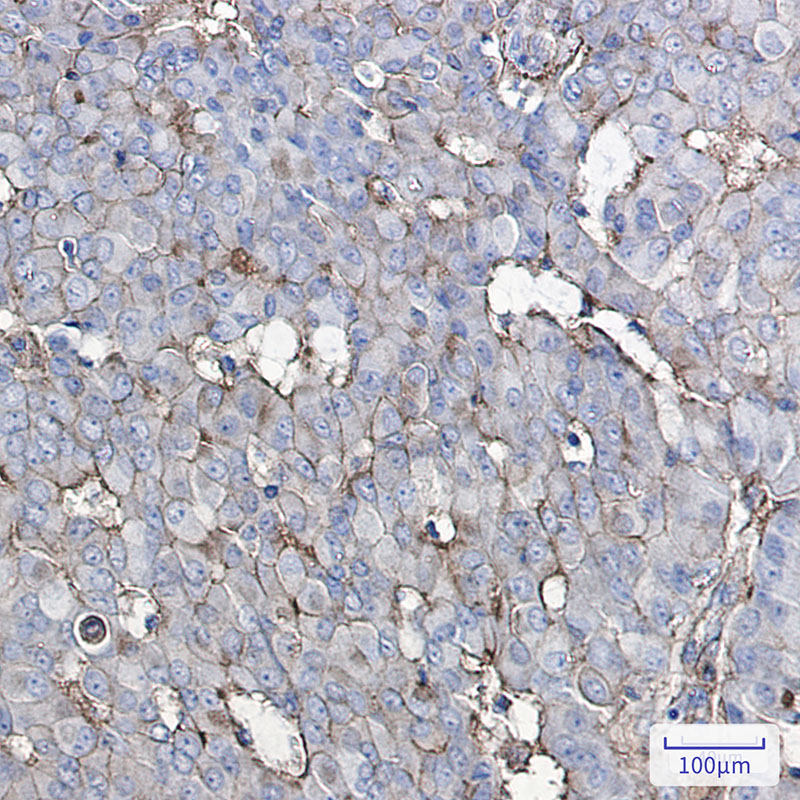

| WB | 1/500-1/1000 | Human,Mouse,Rat |
| IF | 1/20 | Human,Mouse,Rat |
| IHC | 1/50-1/100 | Human,Mouse,Rat |
| ICC | 技术咨询 | Human,Mouse,Rat |
| FCM | 咨询技术 | Human,Mouse,Rat |
| Elisa | 咨询技术 | Human,Mouse,Rat |
| Aliases | GAQ; SWS; CMC1; G-ALPHA-q |
| Entrez GeneID | 2776 |
| WB Predicted band size | Calculated MW: 42 kDa; Observed MW: 42 kDa |
| Host/Isotype | Rabbit IgG |
| Antibody Type | Primary antibody |
| Storage | Store at 4°C short term. Aliquot and store at -20°C long term. Avoid freeze/thaw cycles. |
| Species Reactivity | Human,Rat |
| Immunogen | Recombinant protein of human GNAQ |
| Formulation | Purified antibody in TBS with 0.05% sodium azide,0.05%BSA and 50% glycerol. |
+ +
1. **"Mutations in GNAQ in uveal melanoma"**
- 作者:Van Raamsdonk CD 等
- 摘要:该研究首次报道了GNAQ基因在葡萄膜黑色素瘤中的高频突变(约50%),揭示了其通过MAPK信号通路驱动肿瘤发生的机制,并提出针对该通路的治疗策略。
2. **"Targeting GNAQ/11 mutations in vascular tumors"**
- 作者:Shirley MD 等
- 摘要:研究聚焦于血管瘤中GNAQ突变的作用,开发了一种特异性GNAQ抗体用于检测突变蛋白表达,并验证了其在疾病诊断和靶向治疗中的潜在应用。
3. **"GNAQ signaling promotes melanoma cell invasion"**
- 作者:Feng X 等
- 摘要:通过使用抗GNAQ抗体进行功能阻断实验,发现GNAQ激活通过RhoA通路促进黑色素瘤细胞侵袭,为抑制转移提供了新靶点。
4. **"Antibody-based detection of oncogenic GNAQ variants"**
- 作者:Lane AM 等
- 摘要:该文献描述了一种高灵敏度的单克隆GNAQ抗体的开发,可特异性识别致癌突变体(如Q209L/P),用于临床样本的快速分子分型。
The GNAQ antibody targets the G protein subunit alpha q (Gαq), a critical member of the Gαq/11 subfamily of heterotrimeric G proteins. Gαq couples with G protein-coupled receptors (GPCRs) to mediate intracellular signaling by activating phospholipase C-beta (PLCβ), which triggers downstream pathways like IP3/DAG-Ca²⁺ and PKC cascades. GNAQ plays essential roles in regulating cell proliferation, differentiation, and vascular development.
Mutations in the *GNAQ* gene, particularly at codon 209 (e.g., Q209L/P), lead to constitutive activation of Gαq, resulting in uncontrolled signaling. These mutations are implicated in several pathologies. Somatic mutations are frequently observed in uveal melanoma (∼50% of cases) and blue nevi, driving tumorigenesis via MAPK and YAP/TAZ pathways. Additionally, *GNAQ* mutations are linked to Sturge-Weber syndrome, a congenital vascular disorder affecting the skin and brain.
GNAQ antibodies are vital tools in research and diagnostics. They enable detection of Gαq expression, mutation status, and activation levels in tissues or cell lines, aiding in studies of oncogenic mechanisms and drug resistance. Therapeutic strategies targeting mutant Gαq or its downstream effectors (e.g., PKC inhibitors, MEK inhibitors) are under investigation, highlighting the antibody's role in preclinical validation. Understanding GNAQ's signaling dynamics through antibody-based assays continues to inform precision oncology and rare disease research.
×